Appeal to Authority
Kainan Jarrette and Diana Daly
What is an appeal to authority?
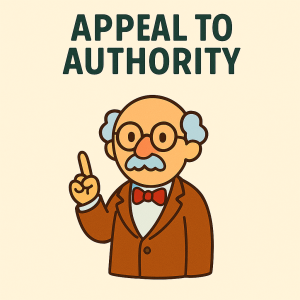
An appeal to authority is when someone claims a belief must be true solely because an authority figure said so, without critically examining whether the authority is relevant or reliable.
As we’ll cover below, there are valid ways to use certain figures of contextual authority to support an argument. Using an authority becomes fallacious when it’s irrelevant and circumvents the actual process of reasoning and evidence.
Examples
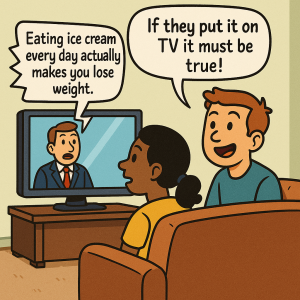
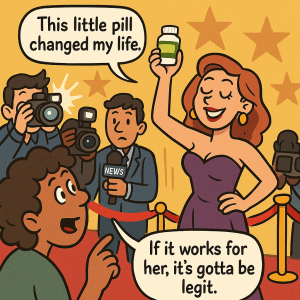
How to Spot an appeal to authority
Appeals to authority can sometimes be tricky to spot, because we live in a world where a lot of people claim authority on a wide variety of topics.
When someone is using an authority as evidence to support their claim, focus on these three questions:
Is This Authority Relevant?
At the most basic level, you want to make sure that the authority being appealed to has expertise on the actual topic at hand. As an example, if you’re discussing climate change, it probably wouldn’t be relevant to use the opinion of a geneticist. The geneticist is very likely intelligent, but that doesn’t mean they have authority in unrelated domains.
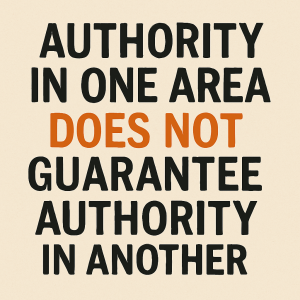
While this may seem obvious, this is often hard to do thanks to a cognitive bias called the halo effect, where we assume that because someone is good, smart, or credible in one domain, they must be equally trustworthy in others.
People can experience this bias even when evaluating themselves, leading to mistakes like:
- A high-performing athlete in one sport assuming they’ll be equally good at all sports
- A CEO of a popular engineering company assuming they can run a social media platform with equal success
- A famous businessperson or actor assuming they’re equally qualified for politics
Unfortunately, though, being good in one domain often has little bearing on ability in a different domain. When someone is referencing an authority as part of their argument, what’s important isn’t if that authority is generally smart or nice.
What’s important is: does their authority actually extend to the topic being discussed?
Is This Authority Reliable?
Even if you’ve established that someone’s authority is in the proper domain of what’s being discussed, this still doesn’t mean they’re a valid and reliable source of information.
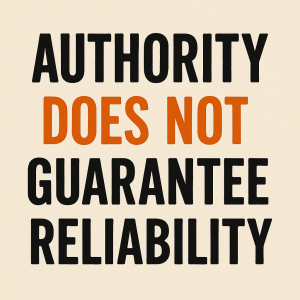
There are doctors who spread medical misinformation, politicians who spread political misinformation, scientists who spread science misinformation, and so on.
When an authority is being referenced, some important points to investigate include:
- Is this person generally respected in their field or are they considered fringe?
- Does this person have a history of lying or spreading misinformation?
- Does this person have any conflicts of interest (such as paid endorsement) related to this topic or claim?
As a general rule, if a single authority’s view on something is valid and reliable, many other related authorities can also be referenced to support the claim. Which leads nicely into our last question:
Is This Authority the Sole Piece of Evidence Being Provided?
While it’s valid to use relevant and reliable authorities as part of support for a claim, remember that:
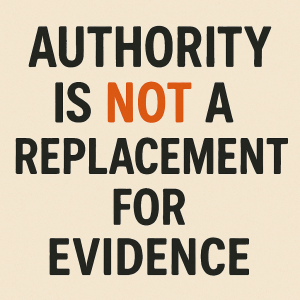
For example, if you were debating the efficacy of vaccines, it wouldn’t be a very strong argument to say “Well, my dad is a doctor and he says they’re fine.”
Instead, a strong argument for vaccinations might look like:
- Referencing the overwhelming medical consensus that they’re safe
- Referencing studies showing what the actual side-effects of vaccinations are (and their likelihood of occurring)1
- Referencing the fact that the modern day vaccination scare was created by a single man who lost his medical credentials for fabricating evidence2
Strong arguments are often based on robust and varied evidence. If someone is trying to end a debate with a single appeal to an authority, that’s a major red flag.
Why appeals to authority Matter
Authority of any kind can be very naturally convincing to us, even when it’s entirely misplaced or irrelevant. Further, it’s arguably never been easier for someone to simply claim authority on a topic they have very little understanding of.
This very idea can often be used to obfuscate the very idea of evidence and truth. It’s not uncommon in popular media now to here things like “Well, you have your experts you can reference and I have mine, so who’s to say who’s right?”
But not all expertise and authority are equal, and while untangling that may require work, it doesn’t mean that the search for truth is meaningless or impossible.
Using authorities in this way usually ends up tying into the idea of group identity we discussed in an earlier chapter. The goal is to get people to redefine authority not through relevance and reliability, but through in-group association. A “valid authority” becomes anyone who agrees with the group, and any authority that disagrees is dismissed entirely.
Once this happens, false authorities can become super-spreaders of misinformation within that group or community, because of the high degree of misplaced trust.
Look Who’s Talking!

Sometimes we all take a shortcut and appeal to an authority when we probably shouldn’t. But if you see a speaker who frequently appeals to authority figures (particularly if they are the same figures) instead of providing evidence, they’re likely doing so as an intentional rhetorical strategy, meant to manipulate the audience (and shut down debate). This should raise serious red flags, as it undermines their credibility as an accurate source of information.
Knowledge Check: Appeal to Authority
Vocabulary
appeal to authority
when someone claims a belief must be true solely because an authority figure said so, without critically examining whether the authority is relevant or reliable
halo effect
a cognitive bias where we assume that because someone is good, smart, or credible in one domain, they must be equally trustworthy in others
References
1 Institute of Medicine. (2012). Adverse effects of vaccines: Evidence and causality. The National Academies Press. https://doi.org/10.17226/13164
2 Menzin, E. (2025, January 30). A study retracted 15 years ago continues to threaten childhood vaccines. Time. https://time.com/7211491/eleanor-menzin-childhood-vaccine-myths-essay/
Media Attributions
- Appeal to Authority Title © ChatGPT is licensed under a CC0 (Creative Commons Zero) license
- Ice Cream Anchor © ChatGPT is licensed under a CC0 (Creative Commons Zero) license
- Little Pill © ChatGPT is licensed under a CC0 (Creative Commons Zero) license
- Authority Text A © ChatGPT is licensed under a CC0 (Creative Commons Zero) license
- Authority Text B © ChatGPT is licensed under a CC0 (Creative Commons Zero) license
- Authority Text C © ChatGPT is licensed under a CC0 (Creative Commons Zero) license
- Shouting Man Big Fan © ChatGPT is licensed under a CC0 (Creative Commons Zero) license
when someone claims a belief must be true solely because an authority figure said so, without critically examining whether the authority is relevant or reliable
a cognitive bias where we assume that because someone is good, smart, or credible in one domain, they must be equally trustworthy in others
how you view yourself in the context of a group you feel you belong to
any deliberate technique a speaker or writer uses to persuade, influence, or shape how an audience thinks or feels about an issue

